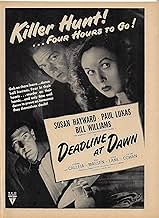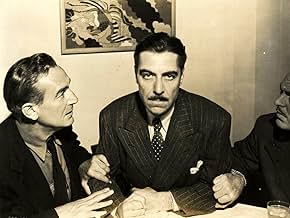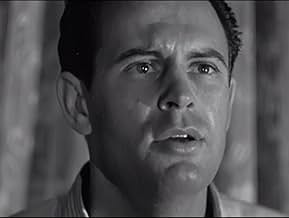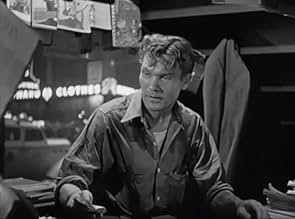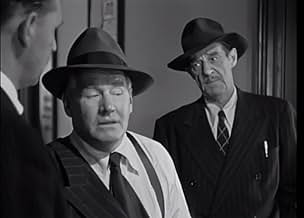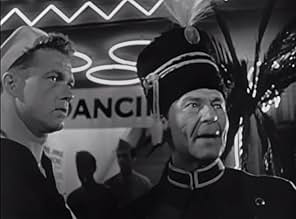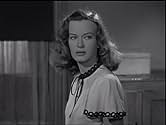VALUTAZIONE IMDb
6,8/10
2474
LA TUA VALUTAZIONE
Aggiungi una trama nella tua linguaAfter a woman he meets is murdered, a soon-to-ship-out sailor has until dawn to find the killer, aided by a weary dance hall girl.After a woman he meets is murdered, a soon-to-ship-out sailor has until dawn to find the killer, aided by a weary dance hall girl.After a woman he meets is murdered, a soon-to-ship-out sailor has until dawn to find the killer, aided by a weary dance hall girl.
- Regia
- Sceneggiatura
- Star
- Premi
- 1 candidatura in totale
Ernie Adams
- Waiter
- (non citato nei titoli originali)
Fred Aldrich
- Beefy Nightclub Guest
- (non citato nei titoli originali)
Walter Bacon
- Commuter
- (non citato nei titoli originali)
John Barton
- One-Legged Man
- (non citato nei titoli originali)
Billy Bletcher
- Waiter
- (non citato nei titoli originali)
Recensioni in evidenza
A decent story based on a novel by Cornell Woolrich, good performances, and snappy dialogue by Clifford Odets elevate "Deadline at Dawn" from 1946. A small film, clocking in at 83 minutes, it packs in a lot of drama.
The film begins with a blind man (Marvin Miller, Mr. Anthony from "The Millionaire") visiting a young woman and demanding $1400 that he is owed. Next thing you know, she's dead.
A young sailor on leave, Alex, (Bill Williams) sobers up after a blackout and sees that he has a lot of money that belonged to one Edna Bartelli (Lola Lane), a girl who invited him to her home to "fix her radio."
Alex has the radio, and at a dime a dance place, he asks for help from June Goth (Susan Hayward) to help him return it. When they get to Edna's, she's dead. Alex is afraid that he did it, but he can't remember.
His leave ends in four hours, so that's all they have to find out what happened. They team up with a friendly cab driver (Paul Lukas). In their investigation, they meet a bunch of low-lifes and it becomes apparent that Edna had a few enemies.
Both Hayward and Williams give delightful performances. Hayward vacillates from the tough girl she is at the dance hall and softness as she gets to know Alex. Williams, who was TV's Kit Carson is the dad of actor William Katt ("Greatest American Hero") and the husband of Perry Mason's Barbara Hale.
True to its New York City wee small hours of the morning scenario, the film is peppered with various actors, each with his or her own story: Joseph Calleia, Osa Massen, Stephen Geray, Roman Bohen, and Constance Worth.
Harold Clurman, a theater director, directed this with an excellent idea of what it's like to be in New York City in the summer - hot, and the weirdos who come out at night.
Very entertaining, though probably too ambitious given the budget and time frame. The ending is a little convoluted.
The film begins with a blind man (Marvin Miller, Mr. Anthony from "The Millionaire") visiting a young woman and demanding $1400 that he is owed. Next thing you know, she's dead.
A young sailor on leave, Alex, (Bill Williams) sobers up after a blackout and sees that he has a lot of money that belonged to one Edna Bartelli (Lola Lane), a girl who invited him to her home to "fix her radio."
Alex has the radio, and at a dime a dance place, he asks for help from June Goth (Susan Hayward) to help him return it. When they get to Edna's, she's dead. Alex is afraid that he did it, but he can't remember.
His leave ends in four hours, so that's all they have to find out what happened. They team up with a friendly cab driver (Paul Lukas). In their investigation, they meet a bunch of low-lifes and it becomes apparent that Edna had a few enemies.
Both Hayward and Williams give delightful performances. Hayward vacillates from the tough girl she is at the dance hall and softness as she gets to know Alex. Williams, who was TV's Kit Carson is the dad of actor William Katt ("Greatest American Hero") and the husband of Perry Mason's Barbara Hale.
True to its New York City wee small hours of the morning scenario, the film is peppered with various actors, each with his or her own story: Joseph Calleia, Osa Massen, Stephen Geray, Roman Bohen, and Constance Worth.
Harold Clurman, a theater director, directed this with an excellent idea of what it's like to be in New York City in the summer - hot, and the weirdos who come out at night.
Very entertaining, though probably too ambitious given the budget and time frame. The ending is a little convoluted.
The real star of this underappreciated noir is Clifford Odets' dialogue, which you either love or you hate. I love it. Really terrific performances, and even the bit players are memorable. Look for Group Theater vet Roman Bohnen in a tiny role as the building janitor with a dead cat-- "she could practically speak." Or Jerome Cowan, a B-movie actor in a zillion Forties flicks, wonderfully slimy as a Broadway producer. Filmed on a backlot, but it seethes New York more than most location movies.
Terrific performances by many actors make this 1946 noir a joy to watch. Nifty murder mystery directed by Harold Clurman and written by Clifford Odets. As mentioned elsewhere on this board the dialog is wondrous; you never know what anyone will say, and everyone seems to "wax philosophic" throughout the film.
The action follows a murder of a woman and how it involves a sailor on leave, a dance-hall girl, and a taxi driver. The story takes place on a sweltering New York night in the early hours. The sailor must catch a 6 AM bus, so there's the "deadline at dawn." As the protagonists track down clues, they run across a bizarre collection of shady types, and everyone seems to to capable of murder, especially of this particular woman.
Susan Hayward gives a stunning performance as June. She starts out as a wisecracking and downhearted taxi dancer who resists getting involved but can't help herself since the sailor (Bill Williams) seems so innocent and naive. She calls him Boob McNutt. As they race around the city tracking down clues (this city never sleeps) they meet a world-weary taxi driver (Paul Lukas) who helps out. All three stars give amazing performances here.
Supporting players are also a knockout with Lola Lane terrific as the victim, Joseph Calleia as her creepy brother, Osa Masson (with a limp), and Marvin Miller, Jerone Cowan, Constance Worth, Al Bridge, Steven Geray, Joseph Crehan and others all solid.
Odets' writing is excellent even if all the characters seem to talk in the same poetic language. But it becomes mesmerizing as the characters seek the truth and talk. It seems that everyone is city wise but a poet at heart.
Hayward looks great with her hair pinned up (it's a sultry night) with bobby pins. She wears little makeup. Williams is also wonderful as the sailor who's not quite as dumb as he seems. Lukas is also solid as the surprising taxi driver.
Great film noir with touches of poetry and humor. What more could you want?
The action follows a murder of a woman and how it involves a sailor on leave, a dance-hall girl, and a taxi driver. The story takes place on a sweltering New York night in the early hours. The sailor must catch a 6 AM bus, so there's the "deadline at dawn." As the protagonists track down clues, they run across a bizarre collection of shady types, and everyone seems to to capable of murder, especially of this particular woman.
Susan Hayward gives a stunning performance as June. She starts out as a wisecracking and downhearted taxi dancer who resists getting involved but can't help herself since the sailor (Bill Williams) seems so innocent and naive. She calls him Boob McNutt. As they race around the city tracking down clues (this city never sleeps) they meet a world-weary taxi driver (Paul Lukas) who helps out. All three stars give amazing performances here.
Supporting players are also a knockout with Lola Lane terrific as the victim, Joseph Calleia as her creepy brother, Osa Masson (with a limp), and Marvin Miller, Jerone Cowan, Constance Worth, Al Bridge, Steven Geray, Joseph Crehan and others all solid.
Odets' writing is excellent even if all the characters seem to talk in the same poetic language. But it becomes mesmerizing as the characters seek the truth and talk. It seems that everyone is city wise but a poet at heart.
Hayward looks great with her hair pinned up (it's a sultry night) with bobby pins. She wears little makeup. Williams is also wonderful as the sailor who's not quite as dumb as he seems. Lukas is also solid as the surprising taxi driver.
Great film noir with touches of poetry and humor. What more could you want?
When a blind ex-husband wearing a boutonnière shows up late in the evening demanding $1400, a good night is probably not in store. Especially when his former spouse's drunken excuse for not paying is "that sailor" must have stolen it. Thus begins Deadline at Dawn, an early noir that's not only a taut and agreeably complicated little mystery but that also aspires, and largely succeeds, in constructing an urban microcosm.
The sailor (Bill Williams) on shore leave has, as sailors on leave do, drunk too much, gambled away his money, been lured up to a wicked woman's apartment, and fallen into a blackout. (The movie's based on a novel by Cornell Woolrich, writing as William Irish, who knew whereof he wrote.) When he climbs back out, thanks to black coffee supplied by a kindly newsie, $1400 tumbles out of his pocket.
Trying to piece together the evening, he strays into a dime-a-dance palace, where he meets a would-be hard case (Susan Hayward in her 24th movie!). Making small talk with his bored-to-the-bone partner, Williams speculates whether a rainstorm might break the heat wave. "Such things have been known to happen," replies Hayward, thereby lowering the thermometer pronto. (The quirky, bristling dialogue by Clifford Odets is one of the many amenities of Deadline at Dawn.) Of course, Hayward inevitably thaws enough to offer counsel to Williams and serve as sidekick in his quest to make amends (he's a square-rigger right out of one of the square states). They return to the robbed woman's apartment only to find her (Lola Lane) dead. It's unclear to the befuddled Williams, and to Hayward, whether he might indeed have been the culprit. Trouble is, he's taking a 6 a.m. bus back to Norfolk, where he's stationed; there's only a few hours left to clear his conscience or fess up to the police.
An immigrant cabbie (Paul Lukas) improbably volunteers as a third ally, and the three, together and separately, embark on various sleuthing expeditions through the dark and soupy streets of Manhattan. For a movie that clocks in under an hour and a half, Deadline at Dawn boasts a cast just short of epic. Among the principals who intersect are Joseph Calleia, as a ruthless yet debonair gangster; Osa Massen as a lame housewife expelled from the rubble of Europe; and Steven Geray as a well-mannered stalker. Joining them are countless players with brief walk-ons, comic or poignant, of the 8-million-stories-in-the-naked-city variety, giving the movie the sole directorial effort by east-coast theater maven Harold Clurman its distinctive tone and texture. (Jules Dassin must have borrowed greedily from it when he came to film his own The Naked City during the sweltering New York summer of 1947.) Deadline at Dawn falls short of perfection. It's too short for all it contains, it's a bit sooty from all the red herrings, and its way out verges on the-butler-did-it (or maybe Roger Ackroyd). But a lot of RKO talent went into its making (in addition to the above, Nicholas Musuraca photographed it, and Hanns Eisler later to become a serious Leftist composer in East Germany wrote the score). But it has its own sweaty, big-city flavor, a pungent New York Story, and a prototype of many noirish delights yet to come.
The sailor (Bill Williams) on shore leave has, as sailors on leave do, drunk too much, gambled away his money, been lured up to a wicked woman's apartment, and fallen into a blackout. (The movie's based on a novel by Cornell Woolrich, writing as William Irish, who knew whereof he wrote.) When he climbs back out, thanks to black coffee supplied by a kindly newsie, $1400 tumbles out of his pocket.
Trying to piece together the evening, he strays into a dime-a-dance palace, where he meets a would-be hard case (Susan Hayward in her 24th movie!). Making small talk with his bored-to-the-bone partner, Williams speculates whether a rainstorm might break the heat wave. "Such things have been known to happen," replies Hayward, thereby lowering the thermometer pronto. (The quirky, bristling dialogue by Clifford Odets is one of the many amenities of Deadline at Dawn.) Of course, Hayward inevitably thaws enough to offer counsel to Williams and serve as sidekick in his quest to make amends (he's a square-rigger right out of one of the square states). They return to the robbed woman's apartment only to find her (Lola Lane) dead. It's unclear to the befuddled Williams, and to Hayward, whether he might indeed have been the culprit. Trouble is, he's taking a 6 a.m. bus back to Norfolk, where he's stationed; there's only a few hours left to clear his conscience or fess up to the police.
An immigrant cabbie (Paul Lukas) improbably volunteers as a third ally, and the three, together and separately, embark on various sleuthing expeditions through the dark and soupy streets of Manhattan. For a movie that clocks in under an hour and a half, Deadline at Dawn boasts a cast just short of epic. Among the principals who intersect are Joseph Calleia, as a ruthless yet debonair gangster; Osa Massen as a lame housewife expelled from the rubble of Europe; and Steven Geray as a well-mannered stalker. Joining them are countless players with brief walk-ons, comic or poignant, of the 8-million-stories-in-the-naked-city variety, giving the movie the sole directorial effort by east-coast theater maven Harold Clurman its distinctive tone and texture. (Jules Dassin must have borrowed greedily from it when he came to film his own The Naked City during the sweltering New York summer of 1947.) Deadline at Dawn falls short of perfection. It's too short for all it contains, it's a bit sooty from all the red herrings, and its way out verges on the-butler-did-it (or maybe Roger Ackroyd). But a lot of RKO talent went into its making (in addition to the above, Nicholas Musuraca photographed it, and Hanns Eisler later to become a serious Leftist composer in East Germany wrote the score). But it has its own sweaty, big-city flavor, a pungent New York Story, and a prototype of many noirish delights yet to come.
Little know post-WWII Film-Nior gem set in New York City on a hot sweltering summer night with one of the most unusual murder mysteries you'll ever see. The movie starts out with Sleepy Parsons, Marvin Miller, pleading with his estranged wife Edna, Lola Lane, for the $1,400.00 that she owes him. Edna after insulting the poor blind and very sick man Sleepy finds out that the money, Sleepy's $1,400.00, that she had in her purse is gone! what happened to it?
Earlier that evening Edna met this young sailor Alex, Bill Williams,on leave at a restaurant that her gangster brother Val Bartelli, Joseph Calleia, owned. After getting him drunk Val cheated him, playing cards, out of his pay. The story got even weirder when Edna telling Alex that she'll pay him to goes up to her place to fix her radio, Alex is a radio repairman in the navy, and got the poor slob even more drunk where he lost consciousness. waking up at a news stand after being given a cup of strong coffee by the newspaper man to clear his mind Alex staggered up on his feet a wad of $1,400.00 falls out of his pocket, where did it come from?
Going to a dance-hall later that night Alex gets very friendly with a local dance girl June, Susan Hayward. After June finished dancing with the costumers Alex goes with June to her place to have a bite to eat. At June's place Alex gets this bright idea to go back to where Edna lives and return the $1,400.00 ,which he feels is hers, with June coming along for the ride. When both get there they find, to their surprise and shock, that Edna was murdered, who did it? was it Alex? was it Sleepy? was it about a half dozen other suspects who had some connection with Edna? All I can say about the movie is that it will floor you with an ending that you won't see coming and even when it does! It will take you a while to realize what you missed in the clues that were so skillfully dropped leading to it all throughout the film.
"Deadline at Dawn" is one of those films that just sticks with you right from the start. Even though there's a number of flaws in it you easily overlook them when you realize that it's going in a direction that will more then make up for them, with it's almost unbelievable ending. Paul Lukas as NYC Cabbie, Gus Hoffman,is at first just an innocent bystander who picks up the couple, Alex & June.
As the movie goes on he becomes more and more central to the story by being more of a detective then a taxi driver as well as having the knowledge of a Ivy League Collage professor! whats this guy doing driving a cab? As the trio slowly work together time is running out to find out not only who murdered Edna but to also clear Alex of the crime, in which he's the prime suspect, and at the same time make it possible for Alex to catch the 6;00AM bus to Norfolk Virginia to report to his ship.
Powerful and surprising ending that has elements to it that you just rarely see in movies today and never in movies back then, in the 1940's. It really has you thinking about what is really good and bad in the world. Like I said before the ending just floored me not that it was so surprising, it was, but that it shows just how human and imperfect people are in the movie as well as they are in real life.
Earlier that evening Edna met this young sailor Alex, Bill Williams,on leave at a restaurant that her gangster brother Val Bartelli, Joseph Calleia, owned. After getting him drunk Val cheated him, playing cards, out of his pay. The story got even weirder when Edna telling Alex that she'll pay him to goes up to her place to fix her radio, Alex is a radio repairman in the navy, and got the poor slob even more drunk where he lost consciousness. waking up at a news stand after being given a cup of strong coffee by the newspaper man to clear his mind Alex staggered up on his feet a wad of $1,400.00 falls out of his pocket, where did it come from?
Going to a dance-hall later that night Alex gets very friendly with a local dance girl June, Susan Hayward. After June finished dancing with the costumers Alex goes with June to her place to have a bite to eat. At June's place Alex gets this bright idea to go back to where Edna lives and return the $1,400.00 ,which he feels is hers, with June coming along for the ride. When both get there they find, to their surprise and shock, that Edna was murdered, who did it? was it Alex? was it Sleepy? was it about a half dozen other suspects who had some connection with Edna? All I can say about the movie is that it will floor you with an ending that you won't see coming and even when it does! It will take you a while to realize what you missed in the clues that were so skillfully dropped leading to it all throughout the film.
"Deadline at Dawn" is one of those films that just sticks with you right from the start. Even though there's a number of flaws in it you easily overlook them when you realize that it's going in a direction that will more then make up for them, with it's almost unbelievable ending. Paul Lukas as NYC Cabbie, Gus Hoffman,is at first just an innocent bystander who picks up the couple, Alex & June.
As the movie goes on he becomes more and more central to the story by being more of a detective then a taxi driver as well as having the knowledge of a Ivy League Collage professor! whats this guy doing driving a cab? As the trio slowly work together time is running out to find out not only who murdered Edna but to also clear Alex of the crime, in which he's the prime suspect, and at the same time make it possible for Alex to catch the 6;00AM bus to Norfolk Virginia to report to his ship.
Powerful and surprising ending that has elements to it that you just rarely see in movies today and never in movies back then, in the 1940's. It really has you thinking about what is really good and bad in the world. Like I said before the ending just floored me not that it was so surprising, it was, but that it shows just how human and imperfect people are in the movie as well as they are in real life.
Lo sapevi?
- QuizJoe Sawyer's character of washed-up baseball player Babe Dooley was based on Chicago Cubs hitting great Hack Wilson whose alcoholism led to his steep professional and personal decline.
- BlooperAt the end, the main characters exit the 8th Police Precinct. It is night, and the streets are deserted. Yet when June and Alex drive away in the police car, it can be seen through the back window of the vehicle that the streets are bustling with activity, cars, and people, and it's bright and sunny.
- Citazioni
June Goffe: If you hear a peculiar noise, it's my skin creeping.
- ConnessioniFeatured in Noir Alley: Deadline at Dawn (2017)
I più visti
Accedi per valutare e creare un elenco di titoli salvati per ottenere consigli personalizzati
- How long is Deadline at Dawn?Powered by Alexa
Dettagli
- Data di uscita
- Paese di origine
- Lingue
- Celebre anche come
- Scadenza all'alba
- Luoghi delle riprese
- Backlot, 20th Century Fox Studios - 10201 Pico Blvd., Century City, Los Angeles, California, Stati Uniti(New York night street scenes)
- Azienda produttrice
- Vedi altri crediti dell’azienda su IMDbPro
- Tempo di esecuzione
- 1h 23min(83 min)
- Colore
- Proporzioni
- 1.37 : 1
Contribuisci a questa pagina
Suggerisci una modifica o aggiungi i contenuti mancanti

